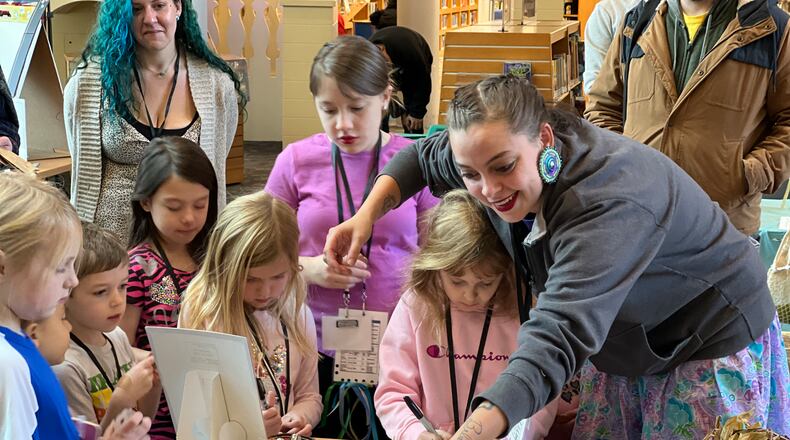Van Hoose also played an integral part in the celebration of Indigenous People’s Day in Dayton last month, after which she turned her sights to a new goal, one that was simultaneously years in the making while also swiftly planned: a festival honoring the lives, art, medicine, and culture of Native Americans.
“I started with some friends, wanting to bring more of an Indigenous voice to the community, and find representation and connection for myself,” Van Hoose said during Saturday’s R.E.A.C.H. Fest, held at the downtown Dayton Metro Library.
REACH stands for “Representation/Reconciliation, Education, Advocacy, Community, and Healing/Health/Human rights.”
“It’s not just about our heritage, but it’s also about building community relationships and partnerships,” Van Hoose said. “Part of all of this connection ... is about our healing, our human rights, and about human trafficking.”
A statistic reported by Native Women’s Wilderness — an organization dedicated to the advancement of Native women’s issues — indicates Indigenous women and girls are 10 times more likely to be murdered than all other ethnicities. According to data published in 2018 by the Centers for Disease Control and Prevention, homicide was the third leading cause of death for Indigenous women.
“It’s an epidemic and it’s born out of our erasure, cultural genocide, marginalization, and hyper-fetishization,” Van Hoose said. “I want everybody to know that we’re not just here, we’re living in your community, we’re hugging your children at Pride, we’re teaching in your classrooms, and we’re really showing up.”
Saturday’s fest offered several stations for attendees to visit, including those featuring Native art, music, food, educational and cultural practices.
As a veteran of the U.S. Air Force and an Indigenous woman, Van Hoose said she has experienced racism in various forms throughout her life, including the issue of Native American names and images being used by sports teams as mascots, a topic that has gained notoriety across the country in recent years.
“My culture has never been separate from myself,” she said. “Stuff like that is painful for us in the indigenous community ... it’s generational erasure.”
Van Hoose channeled this pain to honor her heritage and culture, allowing indigenous people to confidently hold space within non-Indigenous communities.
“I just got tired of fighting and talking about (these injustices) and started to focus on vision, community, connecting and sharing,” she said.
About the Author


